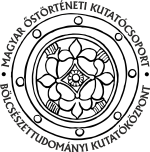The 10th century skeletal material at Szeged-Öthalom
Marcsik Antónia
MŐT Kiadványok 4.(2015) 363–369.
DOI 10.55722/Arpad.Kiad.2015.4_06
The skeletal remains of eight individuals were unearthed dated to the 10th century at Szeged-Öthalom. The age distribution was as follows: infans and juveniles accounted for 37 per cent (3 individuals), while adults for 63 per cent (one female and four males). Their state preservation varied (from medium to poorly preserved). On the basis of the taxonomical analysis, two skulls could be assigned to the Europid type, and one skull represented the Mongolid (Sayan type). The surgical trephination is very important in two skulls (one case is shown a type of metastatic cancer). The taxnomical analysis indicated that the SzegedÖthalom series — characterised by an Mongolid component— connects to the 10th century populations living at the Southern part of the Great Plain (Szeged-Kiskundorozsma-Hosszúhát, Motorway 43, site 25).





